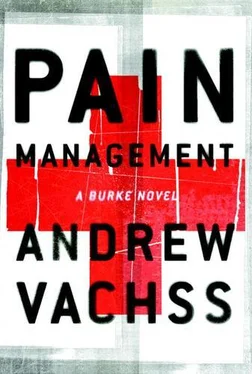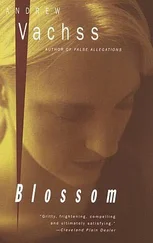“And you knew that exactly how ?”
“You’d be the first hooker I ever saw who didn’t carry something to put money in.”
“Maybe I put it in my—”
“No. You don’t. Besides that, it’s three in the morning. You’d have been out here for hours, but you smell like you just stepped out of a bubble bath.”
She was silent for a long minute. “I know some things about you, too,” she said, finally.
“Do you?”
“Yes. You do things for money.”
“That’s why they call it work.”
“I don’t mean just . . . this. Looking for the girl. Things.”
“What ‘things’ are you talking about?”
“Does it really matter? If the money’s right . . .”
“Sure, it matters. I would never do anything illegal.”
“Yeah, you’re just a model citizen, huh?” she whispered. “Want to give me back my bra?”
I handed it over, my thumb telling me I had been right about the underwire.
“Can I have one of your cigarettes now ?”
I gave her one. She leaned over the console so I could light it for her. Her perfume reminded me of raw sugarcane.
“Thanks.”
I keyed the ignition enough to activate the electronics, zipped her window down.
She leaned back and enjoyed her smoke. Didn’t say a word all through it. “That was good,” she said, snapping the butt out her window into the darkness. “I haven’t had a Kool since the last time I was locked up.”
Sure. Nice of her to spell it all out for me. And in such big letters.
“Want me to take you back to where they’re waiting for you?” I asked her.
“Where would that be?”
“The Subaru.”
“Okay, then; who would that be?”
“I’m not following you.”
“No. I’ve been following you. For quite a while. In the Subaru. It’s mine. There’s no one in it now.”
I pulled alongside the sleek black car. She opened her door, turned to face me.
“This one’s on the house,” she said. “The girl’s not strolling. I can help you find her if she’s anywhere in Portland. You don’t believe me, ask around.”
“I already did that. And you didn’t come up aces . . . Peaches.”
She poked a finger into one of the thick bands at the top of her fishnets, took something out, and handed it to me. A poker chip, it felt like. “Ask again,” she said.
She got out, slammed the Caddy’s door closed with a well-padded hip, and climbed into the Subaru in one smooth motion.
I would have wondered about her leaving her car unlocked in that neighborhood, if I hadn’t seen the shadows shift in the front seat when we’d pulled up.
I’d imagined all kinds of exotic things for the little disk I’d been carrying around in my shirt pocket for a couple of hours. Embedded microchips, the female half of a set, maybe some mystical symbols to a code I’d be expected to crack . . .
But when I finally took a look at it under the lamp over my chair, it turned out to be a plain white plastic disk with milled edges, lettered in black. Just “Ann O. Dyne,” with “Pain Management” underneath, like it was a specialty of the house. On the flip side: “cell/page/cyber,” with separate numbers for each.
I rolled the poker-chip business card between my fingers, trying to get something from it beyond the words. I knew a hundred ways to say S&M, but “pain management” was a new one on me. If that’s what it was . . . and I didn’t think so.
I might have asked Gem, but she wasn’t around.
The kid was small and slender, lady-killer handsome, with blond hair, big liquid brown eyes, and a gentle smile. He circled the table slowly and deliberately, eyeing the scattered balls like an I Ching hexagram he was decoding. “You’re done,” he said to a tall, scrawny guy in his twenties.
“You going to jump it in?” the scrawny guy sneered. “I don’t think so.”
I took a look. From where I was sitting, I could see the cue ball frozen to the short rail at the foot of the table. The green six ball was hanging on the pocket, but the black eight blocked the shot. The scrawny guy was right; the balls were too close together to jump the cue into the six.
“Massé,” the kid said.
“Right!”
“You don’t think so?” a man asked, echoing the scrawny guy’s words.
I turned to look at the speaker, a well-put-together man in his thirties with a shaved head, black-rimmed glasses, and a bright, shallow smile. He sat calmly against the wall, his arms crossed over his chest.
“No, I don’t fucking think so,” the scrawny guy responded.
“How sure are you about that?” the man challenged.
“Real sure.”
“A hundred bucks sure?”
“Oh yeah,” the scrawny guy assured him, affirming the side bet.
The man with the shaved head got up slowly, took a pair of fifties out of his pocket as if he’d been carrying them around just for such an occasion. He put them on the table at the other end from where the kid faced the shot. The scrawny guy came up with his ante. Everybody moved back to give the kid room.
He took one more look. Chalked his cue absently. A couple of teenage girls giggled together, sharing a secret. The kid stepped to the table, held his cue almost perpendicular to the green felt surface. He gripped it overhand as he stroked a couple of times to get the rhythm, then snapped it down and back as smooth as a punch press. The cue ball made a quick semicircle around the eight, gently nudged the six ball home, then reversed at the long rail to give the kid perfect position on the seven ball.
“Big A!” his backer congratulated him, offering a palm to slap.
The scrawny guy nodded his head, as if finally understanding something that had been explained to him many times.
The kid ran the seven, eight, and nine without drawing a breath. The scrawny guy didn’t stay for the finale.
The two teenage girls argued over who was going to rack the balls. I sat down next to the backer. “You taking on all comers?” I asked him.
“Someday we will,” the backer said. “Not today.”
“Why not today?”
“Big A’s not ready. Another couple of years, yeah.”
“He looks ready to me.”
“He’s got the stroke,” the backer said. “And he’s got the eye. But he’s still learning the game. And stamina’s an issue, too—some of the pro games can go for hours, day after day.”
“That’s the plan, to turn him pro?”
“It is. He’s not old enough to play in tournaments yet. By the time he is, we’ll be ready.”
“You’re Clipper, right?”
“Uh-huh. And you’re . . . ?”
“B.B.”
“Oh yeah. I’ve heard about you.”
“Then you know what I’m looking for.”
“Runaway. At least, that’s what people say.”
“For once, then, word on the street’s true.”
“I’m a businessman,” he said. “Not a social worker.”
“Sure. That’s what I want, to do business.”
“You think I know where—?”
“No. But I’ve been here for a while, and I noticed a few things.”
“Like what?”
“Like how your boy works with a house cue, very slick. And the way he pulls girls like a rock star.”
“He does,” Clipper said, proudly.
“So I figured I could maybe talk to him, show him this picture I’ve got of the—”
“Lots of people out here looking for runaways,” he interrupted.
“What’s your point?”
“I don’t know you, that’s my point.”
“Fair enough. But I’m not asking you to turn the girl over. Or even to tell me where she is. Just to get a message to her.”
“What’s in it for me?”
“Money.”
Читать дальше











